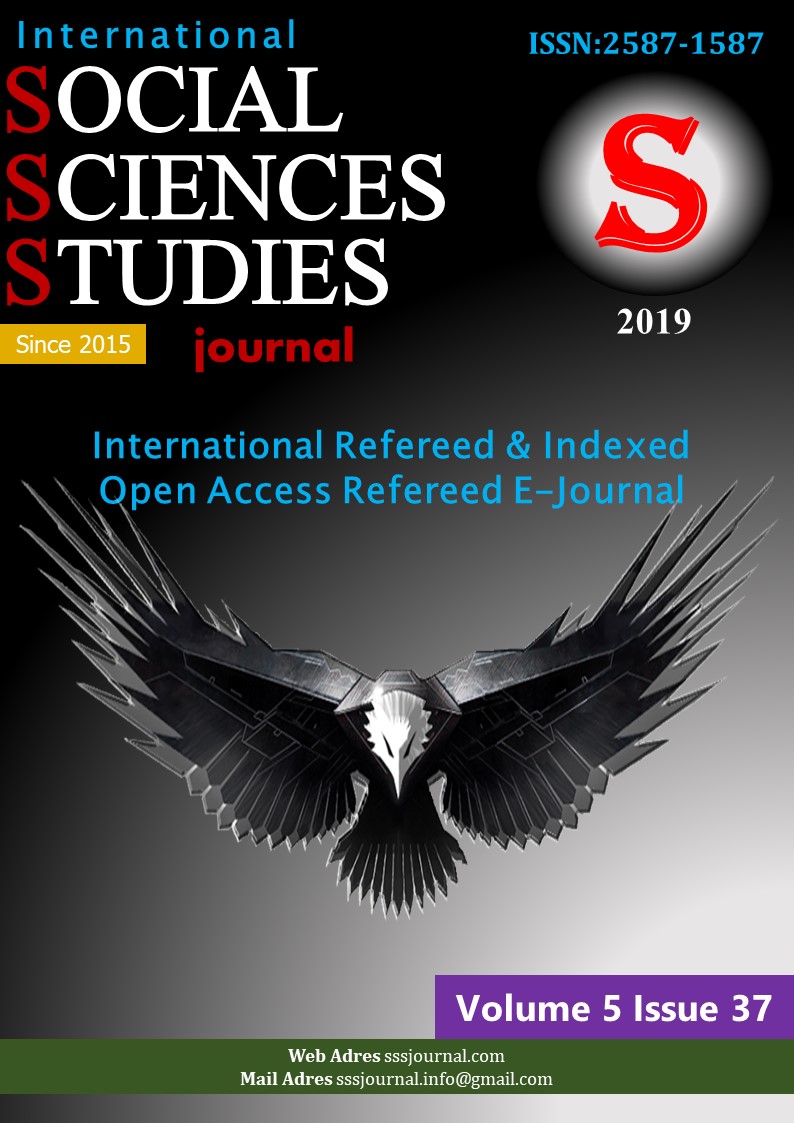Author :
Abstract
Bu araştırma da Orff yaklaşımının müzik öğretmenleri tarafından çocukların müzik eğitiminde kullanılıp kullanılmadığını saptamak ve Orff Schulwerk ile ilgili öğretmen görüşlerinin alınması amaçlanmıştır. Araştırmada nitel araştırma çeşidi olan tipik durum çalışması yöntemi kullanılmış ve amaçlı örnekleme yöntemlerinden biri olan kolay ulaşılabilir durum örneklemesi yöntemi kullanılmıştır. Araştırmada verileri toplamak için yarı yapılandırılmış görüşme formu hazırlanmıştır. Görüşmeler katılımcıların çalıştıkları okulda, okul müdürü ya da öğretmenlerin uygun gördükleri sessiz bir ortamda yüz yüze gerçekleştirilmiştir. Görüşmeler ortalama 10 dakika sürmüş ve öğretmenlerin izni alınarak ses kayıt cihazı ile kaydedilmiştir. Verilerin analizinde, betimsel analiz tekniği ile araştırma sorularının ortaya koyduğu temalara göre yapılan vurgular belirlenmiş ve bu öğretmenlerin görüşleri sunulmuştur. Okul öncesi öğretmenleri ile yapılan görüşmeler sonucunda, öğretmenlerin çoğunluğu orff yaklaşımının çocukların yaratıcılıklarını, beden dilini geliştirdiklerini, beyin gelişimine katkı sağladığını ve işitsel zekasını geliştirdiğini ifade etmişlerdir. Öğretmenlerin çoğunluğu orff yaklaşımını müzik etkinliklerinde haftada bir uyguladıklarını, çocukların bedensel ve zihinsel gelişimlerine katkı sağlamak amacıyla kullandığını söylemişlerdir. Çocuklar için keyifli bir etkinlik olduğunu, çocuğun odaklanaması ve dikkatlerini toplamayabilmesi, çocukların birlik ve beraberliği öğrenmesi açısından avantajları olduğunu belitmişlerdir. Lisans eğitimleri sırasında yada hizmet içi eğitimler de Orff eğitimini aldıklarını belirten öğretmenler, bu yaklaşımın müzik etkinliklerinde herhangi bir dezavantajının bulunmadığını söylemişlerdir.
Keywords
Abstract
Purpose of this study is to find out whether Orff approach is utilized by music teachers while teaching music to children or not, and to obtain teacher opinions on Orff Schulwerk. Being a qualitative research model, typical case study was conducted in the research; while convenience sampling method was utilized as one of purposeful samplings. A semi-structured interview form was prepared in order to collect the data of the research. Interviews with the participants were held at the school where they work, as face-to-face and in a quiet place as suggested by the school principal or teachers. The interviews lasted 10 minutes in average, and were recorded upon the consent obtained from the teachers. While analyzing the data, the stresses made depending on the themes asserted by the research questions were identified through descriptive analysis technique and opinions of the teachers were presented. The interviews held with preschool teachers revealed that majority of them believe the Orff approach develops the creativity and body language of children, contribute to their mental development, and improve their auditory intelligence. Most of the teachers stated that they use the Orff approach in their musical activities once a week so as to contribute to their physical and mental development. They also stated that it is a fun activity for children, as well as having the advantages of enabling them to focus their attention and earn the sense of unity and solidarity. Teachers who learned about the Orff approach during their bachelor education or in-service trainings said that the technique has no disadvantages in musical activities.
Keywords
- Berg, B. (2009). Qualitative Research Methods for the Social Sciences. America: Allyn & Bacon.
- Göncü, İ. (2010). "Okul Öncesi Eğitimde Müzik Eğitiminin Temel Sorunları", Kastamonu Eğitim Dergisi, 18(2): 355- 362.
- Gürgen, E. T. (2007). "Orff Schulwerk ve Kodály Yöntemi’nin vokal doğaçlama, müziksel işitme ve şarki söyleme becerileri üzerindeki etkileri", Doktora Tezi, Dokuz Eylül Üniversitesi Eğitim Bilimleri Enstitüsü, İzmir.
- Gürgen, E., T. (2009). Farklı müzik eğitimi yöntemlerinin öğrencilerin müziksel becerileri üzerindeki etkileri. 8. Ulusal Müzik Eğitimi Sempozyumu.
- Jungmair, U. E. (2003). “Geçmişe ve Geleceğe Bakış”, Info, Sayı:3, Avusturya Liseliler Vakfı Yayınları, İstanbul.
- Karasar, N. (1999). Bilimsel Araştırma Yöntemi: Kavramlar, İlkeler, Teknikler. (8. Baskı), Nobel Yayın Dağıtım, Ankara.
- Kuşcu, Ö. (2010). "Orff-schulwerk yaklaşımı ile yapılan müzik etkinliklerinin okulöncesi dönemdeki çocuklarının dikkat becerilerine etkisi", Yüksek Lisans Tezi, Konya Üniversitesi Sosyal Bilimler Enstitüsü, Konya.
- Kuşcu, Ö., Kayılı, G. & Barışeri, N. (2013). "Okul Öncesi öğretmen adaylarının müzik eğitimine ilişkin tutumlarına Orff Shulwerk pedogojisinin etkisi", Eğitim ve Öğretim Araştırmaları Dergisi, 2 (1): 372-380, ISSN: 2146-9199.
- Kuşcu, Ö. (2017). "Orff-Schulwerk pedagojisi destekli müzik eğitim programının 5 yaş çocuklarının yaratıcılıklarına etkisi", Doktora Tezi, Selçuk Üniversitesi Sosyal Bilimler Enstitüsü, Konya.
- Lincoln, Y.S. & Guba, E.G., (1985). Naturalistic Inquiry. Beverly Hills, CA: Sage.
- Mavesky, M. (2002). Creative Activities for Young Children. 7th Edition. USA: Delmar Adivision Of Thomson Learning Printer.
- Özen, N. (2004). "Çalgı Eğitiminde Yararlanılan Müzik Eğitimi Yöntemleri", Gazi Eğitim Fakültesi Dergisi, 24 (2): 57-63.
- Öziskender, G. & Güdek, B. (2013). "Orff yaklaşımı ile yapılan okul öncesi müzik eğitiminin öğrencilerin sosyal becerilerinin gelişimine etkileri", International Periodical For The Languages, Literature and History of Turkish or Turkic, 8 (3): 213-232.
- Sandıkçı, E. A. (2017). "Orff çalgılarının ana sınıfıçağındaki çocukların ritim becerilerinin geliştirilmesi üzerindeki etkisi", Yüksek Lisans Tezi, Adıyaman Üniversitesi Sosyal Bilimler Enstitüsü, Adıyaman.
- Sungurtekin, Ş. (2005). "Orff Çalgılarının Okul müzik eğitimindeki yeri ve okul öncesi eğitim kurumlarındaki uygulamalarının değerlendirilmesi", Yayımlanmamış Yüksek Lisans Tezi, Uludağ Üniversitesi Sosyal Bilimler Enstitüsü, Bursa.
- Tufan, S. ve Sökezoğlu, D., (2009). Oyun, Hareket, Dans ve Ritim Yoluyla Müzik En 7-11 Yaş Grubu Çocuk Yuvası Öğrencilerinin Sosyal Gelişimler Üzerine Etkileri. Afyon Kocatepe Üniversitesi Devlet Konservatuvarı, Bildiriler – 8. Ulusal Müzik Eğitimi Sempozyumu, 23-25 Eylül (2009).
- Yıldırım, A. ve Şimşek, H., (2006). Sosyal Bilimlerde Nitel Araştırma Yöntemleri. Seçkin Yayıncılık, Ankara.
- Yıldırım, A. ve Şimşek, H., (2008). Sosyal Bilimlerde Nitel Araştırma Yöntemleri. Seçkin Yayınları, Ankara.





